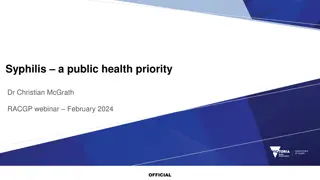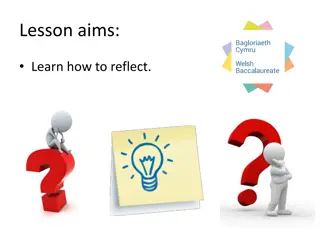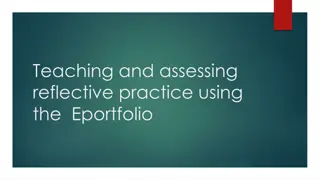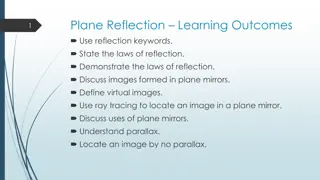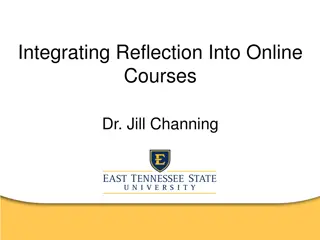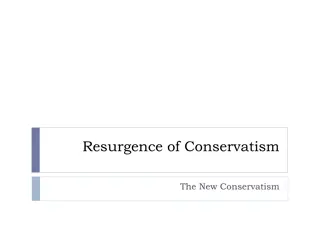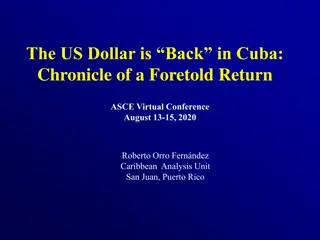Resurgence of Phillis Wheatley: A 250th Anniversary Reflection
Tracking the resurgence of Phillis Wheatley on the 250th anniversary of her book being published. From her early life and achievements to ongoing scholarly debates about her literary voice for freedom, explore the evolving narrative surrounding this pioneering African-American poet. Discover recent developments, controversies, and renewed interest in Wheatley's story, including insights from modern research challenging traditional perspectives.
Download Presentation

Please find below an Image/Link to download the presentation.
The content on the website is provided AS IS for your information and personal use only. It may not be sold, licensed, or shared on other websites without obtaining consent from the author.If you encounter any issues during the download, it is possible that the publisher has removed the file from their server.
You are allowed to download the files provided on this website for personal or commercial use, subject to the condition that they are used lawfully. All files are the property of their respective owners.
The content on the website is provided AS IS for your information and personal use only. It may not be sold, licensed, or shared on other websites without obtaining consent from the author.
E N D
Presentation Transcript
Tracking the Resurgence of Phillis Wheatley on the 250thanniversary of her book being published
Phillis Wheatley is having a moment! A short list of newer developments in the life and the work of our congregation s most famous poet.
What do we already know?: Kidnapped from West Africa around age 7. Learned English in 16 months. And Greek and Latin within 5 years. A genius with languages, the first published African-American woman in the colonies. Colonists couldn t believe that an enslaved person could write such beautiful poetry. She literally had to go to court to prove it. Sort of the Oprah Winfrey of her time, she had fans in both George Washington and Benjamin Franklin. Within 6 months of being published, she was freed from enslavement. Her books were held hostage on The Dartmouth, along with the British tea crates. Baptized at and member of Old South Church
Was Phillis Wheatley a voice for freedom? Scholars and readers have forever debated whether Phillis poems contained a voice for freedom or not. Specifically, her poem On Being Brought from Africa to America was seen as a theological argument for slavery by some: 'Twas mercy brought me from my Pagan land, Taught my benighted soul to understand That there's a God, that there's a Saviour too: But, the poem turns, using Christian values to hold white Christians to judgement: Some view our sable race with scornful eye, Remember, Christians, Negros, black as Cain, May be refin d, and join th angelic train. After her manumission and Susanna Wheatley s death, Phillis was more overt in expressing her antislavery views and is generally considered one of the first Black voices for antislavery in America. Phillis Wheatley has had a resurgence of popularity and interest in the last couple of years in part because of new information that has emerged that helps recast her story.
2020: The Age of Phillis by Honor e Fannone Jeffers NYTimes published an article about the work Honoree Fannone Jeffers put into researching Phillis Wheatley, questioning the established narrative of her personal life. Much of what we know about Phillis Wheatley personally comes from a memoir published in 1834 (50 years after the poet s death) by a white woman named Margaretta Matilda Odell who claimed to be a collateral descendant of Susanna Wheatley. Odell s memoir describes a poor, naked child, with modest, unassuming demeanor who wins the heart of her mistress . Phillis personal story, as told by Odell, moves from beguiled child (not enslaved or abducted) who is redeemed by her benevolent mistress and then tossed into fallen womanhood when she is seduced by an evil Black man, dying in squalid poverty .
2020: The Age of Phillis by Honor e Fannone Jeffers In particular, it is because of this memoir that Phillis husband John Peters has been cast historically as someone who acted the gentleman , and was both too proud and too indolent to apply himself to any occupation below his fancied dignity . She asserts that Phillis never took the name Peters . . . which has also never been proven by records. In Jeffers book she suggests that Odell s memoir created a pesky House Negro narrative that framed Phillis as apolitical and meek. Jeffers spent years searching through Massachusetts archives and found evidence of John Peters living in Boston after Phillis death. (Not having moved to the South as Odell claimed), which peaked her curiosity as to what else might be wrong. And in fact, who was Margaretta Matilda Odell anyway?
2020: The Age of Phillis by Honor e Fannone Jeffers Jeffers found that the only evidence of Odell being related to Susannah Wheatley was her own claims to be so and questions the association and possible motivations behind Odell s memoir. She found evidence that John Peters continued, after Phillis death, attempting to have his late wife s second book published. Perhaps the relationship between Phillis and John Peters was not one of coercion and ruin, but simply one a story of Black love and humanity. The Age of Phillis is actually a work of poetry itself but one based on a depth of research so the poems are both works of creativity with non-fictional elements woven in. Jeffers opens up the possibilities of Phillis story within creative drafts of poems and letters.
2021: Prof. Cornelia Dayton s discoveries There isn t much known about John Peters life before, during, or after his marriage to Phillis, or how they fared as a couple. In addition there is the question of her name Literary scholars refer to her as Phillis Wheatley (likely because of the Odell memoir). But very recently, scholarship has acknowledged that in the last four years of her life, Phillis letters are signed with the name Phillis Peters. University of Connecticut historian Cornelia Dayton s article published in New England Quarterly (vol. xciv, no 3) reveals the legal case she discovered that sheds light on Phillis husband John Peters, and their 4 years of married life together. Dayton ran across the legal case by accident, in researching how New Englanders coped with mental and cognitive health challenges through old wills and property documents. She saw the name John Peters in a 1779 case, but he was not tagged with a particular race in the documents.
2021: Prof. Cornelia Dayton s discoveries So Dayton dove into the papers surrounding this 1779 case with a John Peters, and determined from the auxiliary papers that the man was indeed perceived to be a Black man, and was probably Phillis husband. A key question in their story has been, Where did Phillis and John go when they left Boston for three years in 1780? This legal case answers that question they were in Essex County in what is now Middleton. John Peters apparently grew up in Middleton, and had been enslaved by a farmer named Wilkins. Peters was sold as an adolescent teen, and we don t know what happens then, but he ends up as a freed Black person in Boston by 1776, and becomes a merchant in partnership with a white man. At some point after Phillis and John marry, he renews his relationship with the Wilkins family and as he prepares for his death, John Wilkins asks Peters to be steward of his property and caretaker of his dependents. However things get complicated and that is how it ends up in court, and how Dayton was able to discover so much.
2021: Prof. Cornelia Dayton s discoveries What Professor Dayton infers from these new discoveries: That John Peters had a vision of their life in Middleton where he would be a (successful) yeoman farmer. Things went awry with the living Wilkins dependents, and their venture in Middle came to an end after 3 years. Peters had hoped to provide Phillis with what we would call a writer s life , showing that he knew he d married an intellectual and was attempting to support her gifts and career. That there is new information to be discovered still!
2023: New Poem discovered University of Albany professor Wendy Roberts discovered a new poem by Phillis Wheatley inside a Quaker commonplace book at the Historical Society of Pennsylvania while conducting research into Wheatley s life and legacy. The poem, entitled On the Death of Love Rotch was never claimed by the poet, but was attributed to her by a trustworthy manuscript witness within Phillis network and local poet scene. In an article from the UAlbany website, Roberts explains how poems were passed along person to person, and often given out to students to write in their lessons. She notes that authors were not often noted in these informal passings of poems, and in particular this was how women would share their work with one another. This newly attributed poem was inside a commonplace book which can be thought of as a blank notebook that one would fill with writings, quotes, ideas, and more often kept by poets and scribes.
2023: Book by Tara Bynum University of Iowa professor Tara A. Bynum s book focuses on Phillis long correspondence with her friend and sister Obour Tanner. In an effort to understand the lives and lived experiences of enslaved Black Americans -- complexity can push us towards easy understandings and answers of who they were while inadvertently seeking rebellion in their every word and deed. This search for near constant rebellion through a 21st century lens flattens their lives and experiences. Bynum pushes us towards a deeper understanding of the everyday lives of Black Americans like Phillis Wheatley. She pulls us into their internal worlds, and demands we recognize the pleasures they enjoyed as they lived, in spite of their societal station.
2023: new book by David Waldstreicher Waldstreicher looked at every newspaper published in the Boston area from Phillis arrival in 1761 to her death in 1784 finding some previously unnoticed footprints . He found what he tentatively argues are 13 anonymously published Wheatley poems. He questions the story of Phillis participating in an oral examination in order to prove her authorship, saying the attestation did not come after a performance or trial. Like Tara Bynum, Waldstreicher seeks to eliminate the simple stories, and instead tries to restore Black Americans to their complicated place at the heart of the founding of the United States, while countering simplistic claims that the Revoution was either a noble freedom struggle or hypocrisy all the way day.
Phillis Wheatley Sunday May 14th, 2023 Promenades to Phillis statue on Commonwealth Ave will directly follow each Sunday service Links from today s lesson can be found at oldsouth.org/phillis-wheatley-sunday

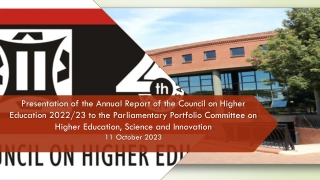
![[PDF⚡READ❤ONLINE] Zen Mind, Beginner's Mind: 50th Anniversary Edition](/thumb/20459/pdf-read-online-zen-mind-beginner-s-mind-50th-anniversary-edition.jpg)
